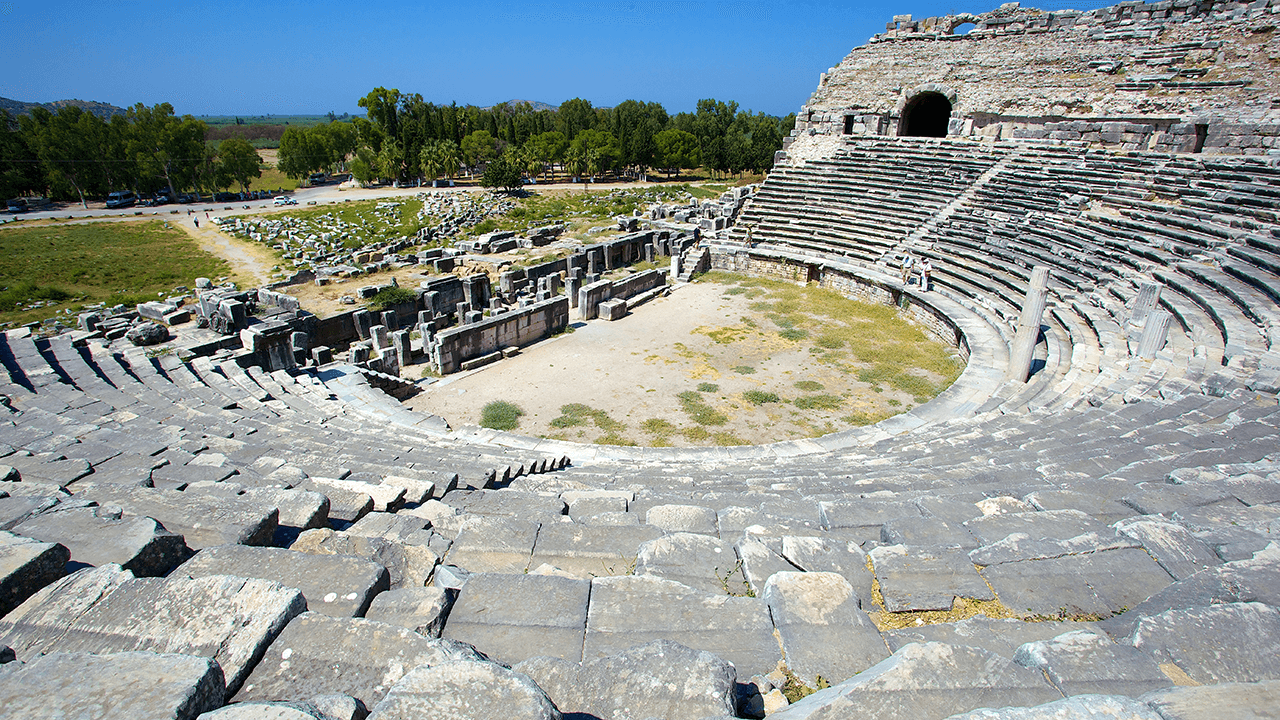Map of Ephesus: History and Monuments
Explore the rich history and iconic monuments of Ephesus in Turkey. Discover the details of this ancient city, tips for visiting, and access an interactive map.
Geographical Location of Ephesus
Ephesus is located in the Izmir region, near the modern town of Selçuk, in Izmir Province, Turkey. Situated between Mount Pion and the mouth of the River Cayster, its privileged location facilitated its development as an important commercial port in ancient times.
History of Ephesus
Foundation and Archaic Period
Founded around the 10th century B.C. by Ionian settlers, Ephesus was established as one of the twelve cities of the Ionian League. During this period, the city developed its cultural and religious identity, with the worship of Artemis being prominent.
Classical and Hellenistic Period
Under Persian rule in the 6th century B.C., Ephesus maintained some autonomy until the arrival of Alexander the Great in the 4th century B.C. After his death, the city passed into the hands of Lysimachus, who relocated it to the valley between Mount Coressos and Mount Pion.
Roman Period
Ephesus reached its peak during the Roman period, becoming the capital of the province of Asia and one of the largest cities of the Roman Empire, with an estimated population of 300,000. During this time, iconic monuments such as the Library of Celsus and the Great Theater were constructed.
Decline and Abandonment
From the 3rd century A.D. onwards, Ephesus began to decline due to invasions, earthquakes, and the gradual silting of its harbor, which made it unusable. Eventually, the city was abandoned in the 15th century.
Main Monuments of Ephesus
The ruins of Ephesus provide a detailed view of ancient architecture and urban life. Some of the most notable monuments include:
Temple of Artemis
Considered one of the Seven Wonders of the Ancient World, the Temple of Artemis was an impressive structure dedicated to the goddess of hunting and fertility. Although only one column remains standing today, its grandeur is remembered by historians and visitors alike.
Library of Celsus
Built in honor of Roman senator Tiberius Julius Celsus Polemaeanus, the Library of Celsus is one of the most iconic buildings in Ephesus. Its richly decorated facade has been restored and stands as a testament to Roman architecture.
Great Theater
With a capacity for approximately 25,000 spectators, the Great Theater of Ephesus is an impressive example of Roman engineering. In addition to theatrical performances, it was also used for public meetings and religious events.
Curetes Street
This main avenue of Ephesus was lined with important public and private buildings, including temples, fountains, and the homes of prominent citizens. Walking down Curetes Street allows visitors to imagine daily life in the ancient city.
Map of Ephesus
For a better understanding of the layout of the ancient city and its monuments, it is recommended to consult an interactive map of Ephesus. Google Maps offers a detailed view of the ruins and their surroundings:
View the interactive map of Ephesus on Google Maps
Visiting Tips
- Opening Hours: The archaeological site of Ephesus is open daily, but hours may vary depending on the season. It is recommended to check the latest hours before visiting.
- Tickets: Tickets can be purchased at the site or online. A combined pass is available, which includes entry to the Terrace Houses, an area with well-preserved mosaics and frescoes.
- Guides: Hiring a local guide or using an audio guide can enhance the experience by providing historical context and details about the monuments.
- Weather: Temperatures can be high during the summer months. It is recommended to bring water, sunscreen, and a hat for sun protection.
Conclusion
Ephesus is a living testament to the grandeur of ancient civilizations that once inhabited the region. Its well-preserved ruins offer a window into the past and allow visitors to immerse themselves in the history and culture of one of the most important cities of antiquity. Planning a visit to Ephesus is a unique opportunity to explore and appreciate Turkey’s historical legacy.



3 thoughts on “Map of Ephesus”
★★★★★
Discovering ‘Map of Ephesus’ was one of the highlights of my trip. Don’t miss out on this gem!
★★★★★
Highly recommend visiting ‘Map of Ephesus’—a site rich with history and unparalleled beauty.
★★★★★
Looking for an authentic and enriching experience? ‘Map of Ephesus’ is the place to be! Absolutely worth the visit.